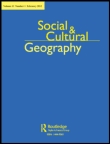
SOCIAL & CULTURAL GEOGRAPHY
Scope & Guideline
Exploring the intersection of society and space.
Introduction
Aims and Scopes
- Spatial Dynamics and Social Practices:
The journal emphasizes the interplay between spatial dynamics and social practices, exploring how individuals and communities navigate, inhabit, and produce spaces. - Cultural Representations and Geographies:
It investigates cultural representations and their geographical implications, looking at how narratives, symbols, and practices shape identities and community belonging. - Interdisciplinary Methodologies:
The journal employs a range of interdisciplinary methodologies, including qualitative research, visual methods, and critical theory, to understand complex social and cultural phenomena. - Emotional and Affective Geographies:
It focuses on emotional and affective geographies, examining how feelings, emotions, and subjective experiences influence spatial practices and vice versa. - More-than-Human Perspectives:
The journal considers more-than-human perspectives, exploring the relationships between humans and non-human entities, and how these interactions shape cultural and spatial understandings. - Political and Economic Contexts:
It critically analyzes the political and economic contexts that shape social and cultural geographies, including issues of power, inequality, and social justice.
Trending and Emerging
- Digital and Virtual Geographies:
There is a growing interest in the impact of digital technologies on social and cultural practices, examining how digital spaces shape identities, communities, and relationships. - Affect and Emotion in Space:
Recent papers emphasize the role of affect and emotion in understanding spatial practices, highlighting how feelings and emotional experiences influence social interactions and place-making. - More-than-Human Geographies:
Emerging themes focus on more-than-human geographies, exploring the complexities of human-nonhuman interactions and their implications for cultural and spatial understandings. - Care and Community Practices:
There is an increasing emphasis on care practices and community engagement, reflecting a broader societal shift towards understanding the importance of care in social and spatial contexts. - Intersectionality and Social Justice:
The journal is increasingly publishing works that address intersectionality and social justice, examining how various forms of inequality intersect and manifest in geographical contexts. - Environmental Justice and Sustainability:
Research on environmental justice and sustainability is on the rise, with a focus on how social and cultural geographies respond to ecological challenges and the implications for marginalized communities.
Declining or Waning
- Traditional Geopolitics:
There seems to be a decrease in publications focusing on traditional geopolitics, as the journal shifts towards more localized and grassroots perspectives on geography. - Historical Geographies:
Research focused on historical geographies, particularly those that do not engage with contemporary issues or current events, appears to be less frequent as the journal prioritizes relevance to current social and cultural challenges. - Static Representations of Space:
There is a noticeable decline in studies that treat space as a static entity, moving towards more dynamic and fluid understandings of spatial practices. - Conventional Economic Geographies:
Themes centered around conventional economic geographies, such as traditional market analyses, are becoming less prominent as critical, intersectional approaches gain traction. - Fixed Identity Categories:
The journal is moving away from fixed identity categories in favor of more fluid, intersectional identities, indicating a shift in focus towards more complex understandings of identity.
Similar Journals
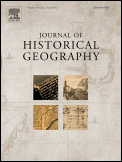
JOURNAL OF HISTORICAL GEOGRAPHY
Advancing Insights into Spatial Dynamics Across ErasWelcome to the Journal of Historical Geography, an esteemed publication dedicated to enriching the fields of archaeology, geography, and history through innovative research and critical discourse. Published by Academic Press Ltd - Elsevier Science Ltd, this journal has been a cornerstone of interdisciplinary scholarship since its inception in 1975, now extending its coverage through 2024. With an impressive Scopus ranking that places it in the top quartile for history and strong standings in archaeology and geography, this journal offers insightful analyses that are crucial for understanding spatial dynamics over time. Researchers and professionals alike value its commitment to accessibility and rigor, making it an essential resource for academics engaged in the study and teaching of historical geography. Although the journal operates under subscription access options, its contributions undoubtedly enrich scholarly dialogue and foster a deeper understanding of our historical landscapes.
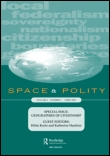
SPACE AND POLITY
Unraveling the Dynamics of Space and PowerSPACE AND POLITY is a renowned journal published by Routledge Journals, Taylor & Francis Ltd, focusing on the interdisciplinary study of spatial dynamics and governance processes from both geographical and political perspectives. With an ISSN of 1356-2576 and E-ISSN of 1470-1235, it has established a significant academic presence since its inception in 1997. The journal has maintained a strong impact factor, achieving a Q2 ranking in Geography, Planning and Development and a prestigious Q1 ranking in Political Science and International Relations as of 2023. It is recognized for its contributions to the understanding of spatial politics and the interplay between space and governance, making it an invaluable resource for researchers, professionals, and students alike. Though not an open-access journal, it is accessible through numerous academic databases, ensuring that its cutting-edge research reaches a wide audience. The journal's continuing evolution, with a converged timeline extending to 2024, reflects its commitment to advancing knowledge in these vital areas of study, highlighting the importance of spatial factors in political and social contexts.
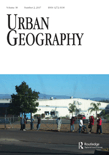
URBAN GEOGRAPHY
Advancing Insights in Urban StudiesURBAN GEOGRAPHY, published by Routledge Journals, Taylor & Francis Ltd, is a leading interdisciplinary journal that has been at the forefront of urban studies since its inception in 1980. With an impact factor that positions it in the prestigious Q1 category in both Geography, Planning and Development and Urban Studies, this journal is recognized for its rigorous research that informs policy and practice in urban environments. With a Scopus ranking of #20 out of 279 in the field of Urban Studies and #79 out of 821 in Geography, Planning and Development, it offers valuable insights for scholars, professionals, and students alike—enhancing our understanding of the complex dynamics that shape urban spaces. URBAN GEOGRAPHY is pivotal for those looking to advance their expertise in urban analytical frameworks, urbanization trends, and sustainable development strategies. Submissions are welcomed from a diverse range of perspectives, making it a vital resource for anyone invested in the future of urban landscapes.

Journal of Cultural Geography
Unveiling the Dynamics of Culture Through GeographyJournal of Cultural Geography, published by Routledge Journals, Taylor & Francis Ltd, stands as a premier platform in the field of cultural studies and geography. With its ISSN 0887-3631 and E-ISSN 1940-6320, this journal has been a significant contributor to scholarly discourse since its inception in 1980. The journal's commitment to exploring the intricate relationships between culture and geography ensures its relevance in both academic research and practical application, making it an invaluable resource for researchers, professionals, and students alike. As a Q1 journal in Cultural Studies and a Q2 journal in Geography, Planning, and Development, it is recognized for its impactful contributions, evidenced by its strong Scopus rankings in the 84th and 45th percentiles, respectively. Though not an open-access journal, the rich, peer-reviewed content provides insights and findings that push the boundaries of our understanding in these interconnected fields. Encompassing research from 1980 to the present, the Journal of Cultural Geography is dedicated to fostering academic dialogue and advancing knowledge, making it an essential addition to any scholarly collection.
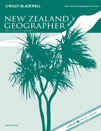
New Zealand Geographer
Pioneering Research for a Sustainable FutureNew Zealand Geographer, published by WILEY, is a distinguished academic journal that has made significant contributions to the fields of geography, planning, and earth sciences since its inception in 1945. With a dedication to advancing knowledge through rigorous research and critical analysis, the journal encompasses a broad spectrum of topics relevant to both regional and global geographies. This journal is currently indexed in Scopus, achieving commendable rankings in multiple categories, including a Q3 status in both Earth and Planetary Sciences and Geography, Planning and Development for 2023, highlighting its relevance and standing within the academic community. Although it does not currently offer open access, its commitment to providing insightful and impactful content ensures that it remains a vital resource for researchers, professionals, and students alike seeking to deepen their understanding of geographical phenomena. The journal's ongoing publication until 2024 continues to foster scholarly discourse, making it an essential platform for innovative research in geographic studies.
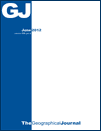
GEOGRAPHICAL JOURNAL
Advancing geographical knowledge for a sustainable future.Geographical Journal, published by Wiley, is a leading scholarly resource dedicated to advancing the field of geography and earth-surface processes. With an established history dating back to 1973, this prestigious journal thrives on disseminating high-quality research, featuring a robust archive that encompasses critical insights from various geographical and environmental studies. As evidenced by its impressive Q1 rankings in both Earth-Surface Processes and Geography, Planning and Development, the journal stands out in its commitment to impact and relevance in the academic community. Although not Open Access, the journal provides researchers, professionals, and students with invaluable peer-reviewed articles essential for understanding complex geographical phenomena. Whether you are focused on socio-environmental interactions or earth sustainability, Geographical Journal serves as a cornerstone for innovative research, fostering knowledge that shapes policy and practice.

Biblio 3W-Barcelona
Innovating library management for a modern society.Biblio 3W-Barcelona is a prominent academic journal published by the Universitat de Barcelona, Servei Publicacions, focusing on the dynamic field of library and information science. Established to foster scholarly communication, this journal provides a platform for researchers, professionals, and students dedicated to the advancement of bibliographic studies and library management. Despite lacking a current impact factor, Biblio 3W-Barcelona is recognized for its commitment to high-quality research and its contribution to the field, making it a valuable resource for those engaged in understanding the complexities of information dissemination in modern society. The journal features original research articles, critical reviews, and case studies that invite varied perspectives within the realm of librarianship. Readers can access its comprehensive body of work freely, enriching their knowledge and fostering practical applications in library science. For submission guidelines and further information, visit their website.

Geographia Polonica
Unveiling the Intersections of Geography and SocietyGeographia Polonica is a premier academic journal published by the Polish Academy of Sciences, Institute of Geography and Spatial Organization, renowned for its contributions to the field of geography and related disciplines. With a history spanning from 1972, it has evolved into a vital resource for researchers and professionals, addressing a wide spectrum of topics from cultural studies to urban planning and development. Geographia Polonica is indexed with impressive rankings in various categories, including a Q1 classification in Cultural Studies and significant positions in Earth and Planetary Sciences and Urban Studies, reflecting its influence and recognition in these critical areas. Although it operates under a traditional subscription model, its commitment to high-quality, peer-reviewed research ensures that the latest findings and advancements are accessible to the academic community. With its rich archival content and contemporary insights, Geographia Polonica serves as an essential platform for scholarly dialogue, making it an invaluable reference for students, researchers, and professionals eager to explore the complexities of spatial organization and geographical phenomena in a global context.
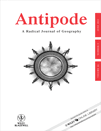
ANTIPODE
Exploring the Nexus of Society and EnvironmentANTIPODE is a leading academic journal published by WILEY, renowned for its contributions to the fields of Earth-Surface Processes and Geography, Planning, and Development. With an impressive impact factor and ranked in the Q1 category for both Earth and Planetary Sciences and Social Sciences, it is a pivotal resource for researchers and professionals who seek to explore the complex interplay between social and environmental dynamics. Since its inception in 1969, ANTIPODE has provided a platform for innovative and critical scholarship, fostering discussions that drive forward-thinking research in its domain. The journal's rich history continues into 2024, as it remains committed to publishing high-quality, peer-reviewed articles that challenge norms and inspire further research. Researchers, professionals, and students will find in ANTIPODE not only a journal but a community dedicated to advancing knowledge and practice in geography and development studies.

Atelie Geografico
Advancing Knowledge in Socio-Environmental Research.Atelie Geografico, published by the Instituto de Estudos Socio-Ambientais at UNIV FED GOIAS, serves as a crucial platform for the dissemination of research within the realm of Geography and related disciplines. With an ISSN of 1982-1956 and an e-ISSN of 1982-1956, this Open Access journal has been championing the free exchange of knowledge since 2007, making it accessible to a global audience of researchers, practitioners, and students. The journal's scope spans vital areas including Urban Studies, Management and Policy, Nature Conservation, and Tourism, highlighting its interdisciplinary approach to understanding socio-environmental dynamics. Despite its ranking in the Q4 category across several fields in 2023, the journal emphasizes the importance of emerging voices and innovative research, particularly as it converges towards exploring contemporary issues from 2019 to 2024. Located in Brazil, Atelie Geografico not only enriches the academic landscape but also responds to regional and global challenges, encouraging a diverse readership engaged in the critical study of environmental and social interactions.